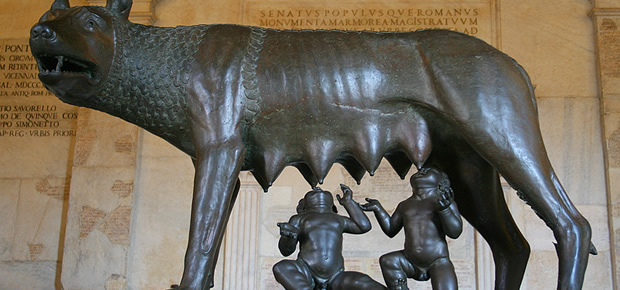
2.1 The Origins
The origins of Rome and the early centuries of its history are still the subject of research that still fascinate generations of historians and experts on the subject of simple. The medieval culture and then the Renaissance humanist thought and saw in ancient Rome and its story told by the ancient, an extraordinary repertoire of behavior patterns, a political and social reality in which they would focus exceptional moral exemplars worthy of being imitated by posterity. The case is perhaps the most famous literary Nicolo Machiavelli (1469-1527) with Discourses on the First Decade of Titus Livius. The two main historical works that speak of ancient archaic Rome, ie, the first books of the Ab Urbe Condita Livy (59 a.C. – 17 d. C.), e la Rhomaiké Archaiologìa Dionysius of Halicarnassus (The first century BC) have appeared at the time of the Emperor Augustus (63 a.C. – 14 d.C.). The same authors state that their ancient historical reconstruction had to rely on only a small part of written testimony, is because in ancient Rome and the writing was not practiced, is because during the Gallic plunder suffered by Roma in 390 a.C. the archives of the Roman state, where the records were kept of the city's history written by the popes, would be destroyed in almost all. Skepticism by scholars who did accept the works of Livy and other writers as mere inventions, was followed by the discovery of numerous archaeological remains of the Archaic period in Rome and other centers of Lazio, has shown that in many cases many elements of convergence with the statement made by the ancient written sources. It has been found, eg, that at the end of the seventh century A.C. the area of the Roman Forum was paved just as Latin authors describe the construction of shops in the area, and that the Forum was built a brick building right where the ancient sources place the king's house, the regal. More recently, other excavations have shown that the construction activities attributed by sources to the first king of Rome, find interesting points of comparison thanks to some discoveries on the northern slopes of the Palatine.
The sources of our knowledge, despite the fact that during the period of archaic Rome the oral tradition was the only source of transmission of historical facts, allow us to know good reliability with many aspects of ancient Roman history and society. The work of Titus Livius (Ab Urbe condita), eg, assertion for the same author, first and foremost about to show his readers "what were the living conditions (life), such as costumes (mores), in virtue of which men and what means (the men and the arts) was formed and increased, in peace and war, I reign ".




